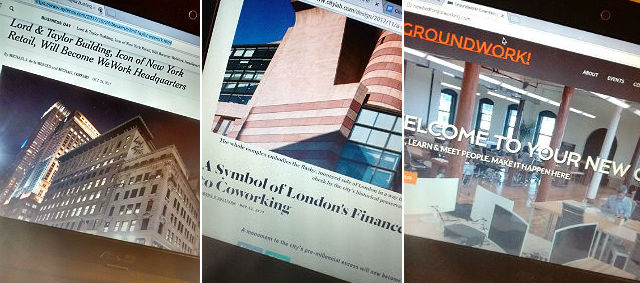New York, London … and New Bedford love coworking

As a city whose fortunes rose and fell with industries as diverse as whaling and textiles, New Bedford knows a thing or two about reinvention. While sometimes painful, it’s as inevitable as the United States transforming from a mercantile, maritime-based economy into an industrial powerhouse.
But….when does a movement go mainstream? When does a choice become a necessity? And, when can you pinpoint the moment when something recedes into the past as pointedly as whaling or textiles once did in New Bedford?
That moment may be upon us. Because in 2017, coworking came into its own – not just in New Bedford, at Groundwork! – but globally and in a big way.
In New York City and London, two iconic buildings – each of which signified something unique about both cities – were snatched up by WeWork, a chain of coworking spaces, and thus ceased to function as retail or financial centers of business. Instead, the Brave New World will now take reside in each – and that world will be defined by the economic egalitarianism of individual members rather the landlords.
On Oct. 24, 2017, The New York Times reported, “From the moment its doors opened more than a century ago, the Lord & Taylor building on Fifth Avenue in Manhattan has stood as a monument to old-school retail.
“But now, the forces buffeting the retail industry are diminishing Lord & Taylor’s presence as a New York institution. The company that owns the department store chain, Hudson’s Bay, said Tuesday that it was selling off the flagship store to WeWork, a seven-year-old start-up whose office-sharing model is helping to reinvent the concept of work space.”
Retail gave way to coworking and the gig economy on Fifth Avenue. (The gig economy is defined by people who earn their living as most Groundworkers do – as freelancers, tech pioneers, corporate workers who have the freedom to work away from the “home office,” entrepreneurs, business start-ups, or just plain creative people who seek an environment that releases rather than stifles them.)
Then, the same thing happened across the pond in London.
On Nov. 30, 2017, The Atlantic magazine’s City Lab website posted that WeWork again had found another home. City Lab wrote, “That a co-working company is guzzling big city office space isn’t in itself shocking; the building isn’t even the largest of three new WeWork locations in London. However, the new site isn’t just any building. The site of No. 1 Poultry is as famous for its eye-melting structure as it is for its long-standing role as a bellwether showing the direction in which London is heading at any given moment.
“Right now, the move suggests something notable. Tech-associated co-working spaces have moved beyond their recognized heartland, the ex-industrial and warehouse buildings that fringe the edge of central London. They’re now seeping into the financial district’s heart, gobbling up distinct buildings previously reserved for the city’s financial elite.”
We’re ahead of the curve here in New Bedford. Groundwork!, at 1213 Purchase Street – The Quest Center – has been at the heart of New Bedford since becoming the city’s first coworking space over two years ago.
When it opened its doors it, too signified something important in its home city of New Bedford. It signified that the former whaling capital, textile center and commercial fishing powerhouse was diving deep into the new headwinds roiling the economic waters of the nation.
Overlooking New Bedford’s storied harbor and housed in a building that was once a textile school, like the locations in New York City and London, Groundwork! and its members are helping to redefine its city for the future.
Perhaps you can pinpoint a moment in time when the past gives way to the future.
It’s when you can see it with your own eyes every day. Come take a look.
- A Pride month to be proud of in New Bedford - May 30, 2019
- OUTTAKE: Inside the First Baptist Church renovation - May 2, 2019
- New Bedford Economic Development Council’s Spring Fling - April 30, 2019
